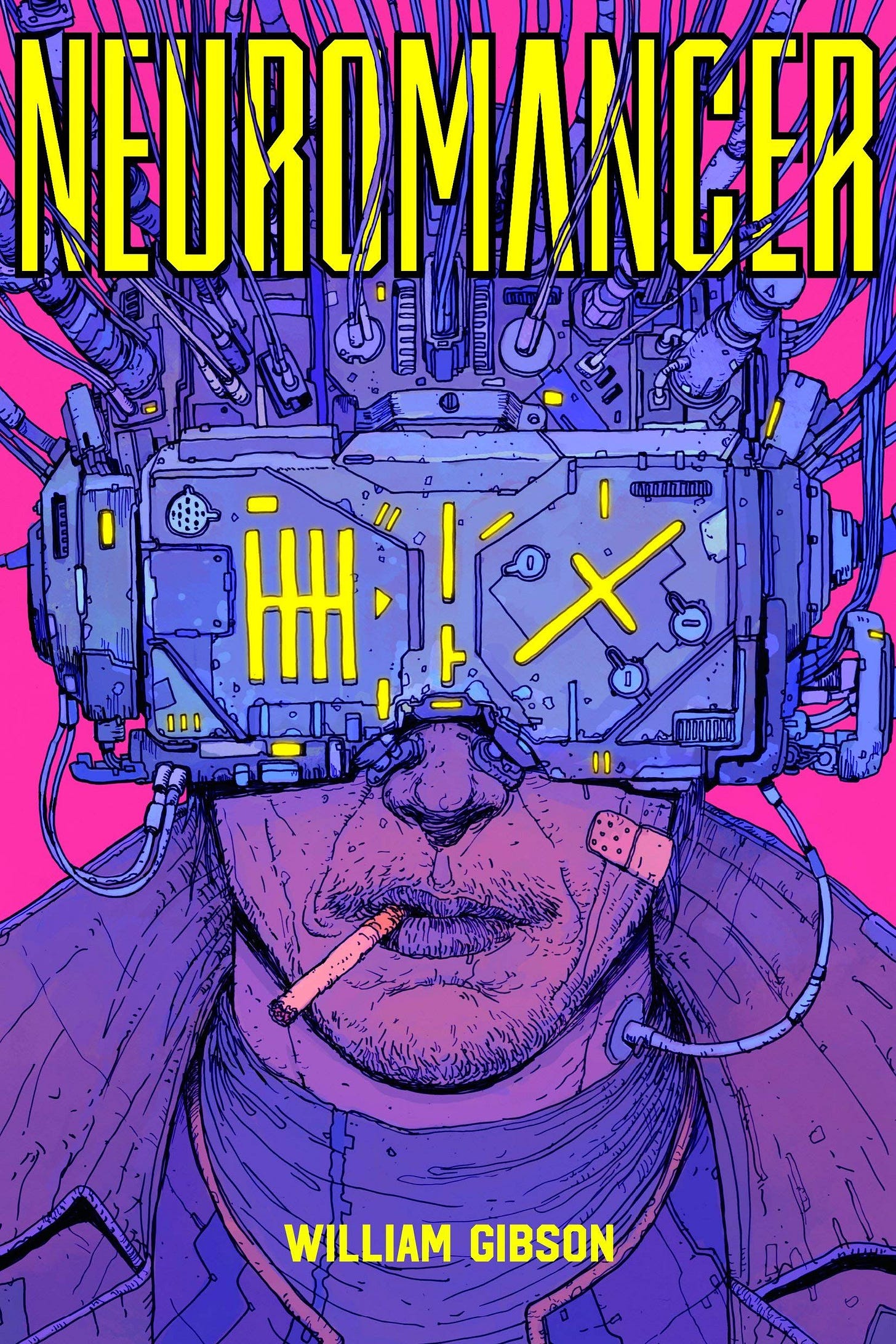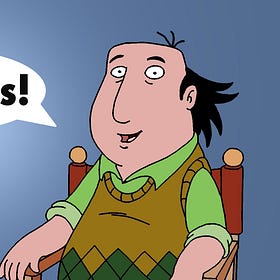In 2024, I spent the year reading William Gibson and rather than write about it, I decided to invite people onto a podcast to discuss the novels. You can check out the whole catalogue of episodes here.
My history with William Gibson had been a troubled one. I even put Neuromancer on a list of books I hated.
Books I Hated
I’ve long suspected that people prefer when I talk shit versus when I speak from the heart, so I’m going to speak shit from the heart.
But I muscled through and spent a year discussing his books. I probably would have had more success and fun had a picked any other author, but whims and weariness guide me. Despite many of my issues with Gibson as a writer, I do think he’s one of the best at conceptual writing and he’s a great stylist.
Anyrate, I did the work so you don’t have to and now I’ll tell you what to read and what to skip.
Gibson’s career is somewhat unusual in that it’s broken down into distinct trilogies. Because of this, I can’t just tell you to begin with the middle book in a trilogy. Or, I suppose I could, since the novels are mostly standalone, despite being trilogies. But it feels weird to me to recommend that you read that way.
Where to Start
This is for the All-Inners, the gobble-em-down fienders who cannot be turned away nor told to try some other squaller for a place to scrump on some delectables.
So if you must read all of William Gibson, despite my best protestations, here’s how you do it.
Neuromancer (1984)
I genuinely do not like this book. After speaking with my good friend
, I found an appreciation for it. But it’s not a particularly successful novel, though its influence is unmistakable and unavoidable. He revolutionized science fiction in this single novel printed on disposable paper that ended up being a megabestseller.The narrative voice is addictive and the novel begins with one of the best first chapters you’re likely to come across. This carries you through for quite some time, but the novel begins to quagmire in technobabble and perplexing motivations and muddied political machinations. The propulsiveness of the narrative is meant to hold you through to the end as we dash across continents and into space and back down to earth and through cyberspace, but I found this mostly confusing and not entirely that interesting.
Even so, if you must read Gibson, this is the real place to start. From there, do as I did and read through the man’s career in publication order.
Listen to our episode here:
If you only read one
For most authors, this is the way to approach them. Dip in a toe and get a feel for the water. I am perhaps somewhat unusual in that I find a lot of interest and joy in reading ten books by the same person in a condensed time period. This is very useful for some writers, especially if they have a varied body of work, but less successful with an author like Gibson who largely writes variations on the same theme.
It’s a good theme so he’s gotten a lot of mileage out of it, though.
The Difference Engine (1990)
This is a bit of an odd one for True Gibsonians since it was a collaborative novel with Bruce Sterling, but I really think it might be his best. At the very least, it demonstrates much of what Gibson is great at and what he’s capable of.
Big concepts, intense interest in underclasses and social structures, and subversion of expectations. I think the social structure of this novel is Gibson at his best and, sadly, something that he never really achieves again.
I think this is my favorite of his novels, though it does suffer from some of the quagmirely writing that so often plagued him throughout his career.
Listen to our episode here:
Pattern Recognition (2003)
I think this is Gibson’s best novel and I don’t think it’s really that close, though this is not his best trilogy. Even so, if you only read one novel by Gibson, this is a pretty good one to pick.
You get all of his fixations and, perhaps, the best description of the internet and our intersections and interactions with it possible. Also, strangely, it’s a contemporary novel. The first that Gibson would publish and, in my view, the best. While all writers are always writing about the moment they’re alive, this is really one of the best contemporary literary thrillers I’ve encountered.
Great protagonist with a clear narrative, which is something Gibson very much is not known for.
Listen to our episode here:
The Best Trilogy
Since his career is broken up into discrete trilogies, I really do think this is worth commenting on at length. Best here is meant more as favorite. His best trilogy is the Blue Ant Trilogy. It’s him at his most competent and masterful, but I like the rough edges of my pick. I like the sloppy imperfections that actually make it shine all the brighter when it manages to catch the light.
The Bridge Trilogy
Virtual Light (1993) is a near future science fiction novel structured around coincidence and happenstance. It manages to feel both like Pulp Fiction and Samuel R Delany’s Dhalgren. There’s a lot of humor and wackiness but also Gibson at his most evocative. The Bridge is a fascinating setting, and while we don’t really get clear descriptions of it, we feel it. We come to know it on our bones.
A truly fascinating novel and sort of a better version of Count Zero, which was my favorite novel from The Sprawl Trilogy.
Listen to our episode here:
Idoru (1996) might be one of the best William Gibson novels. It captures something so very true to life as we live it now in the 2020s despite being written in the 90s. In many ways, this is simply a good version of Mona Lisa Overdrive, which I think is one of Gibson’s worst novel—possibly the worst.
Where my problem with Mona Lisa Overdrive was that every protagonist felt like they were locked into a train heading for a destination without agency, Idoru puts people in the driver’s seat and demands that we go go go.
Plus, conceptually, it’s just Gibson at his very best. I imagine this was unnerving to the point of delirium and incomprehensibility in the mid-90s, but in 2024 it felt almost common place to encounter these ideas
Which is startlingly terrifying in its own way.
Listen to our episode here:
All Tomorrow’s Parties was shaking up to be my favorite Gibson novel until we ran into the second half where many of Gibson’s worst habits began to crowd out what was good and beautiful and holy.
Listen to our episode here:
The Ones to Skip
I won’t belabor this here. There are many novels he wrote that I think are just not that good. Many of his novels feel like rewrites of other novels, in a narrative and structural sense, which makes his whole bibliography full of redundancies or, perhaps, more generously: echoes.
But there are also just novels that I think are flat out bad. Especially his two most recent novels, but especially his most recent novel Agency.
Absolutely skip Agency. It may be one of the worst novels I’ve read in years. Or, I would say that but I read a novel shortly after it that was unbelievably worse. Which is really saying something!
The other novels I would skip, even if you really did want to give Gibson the old college try:
Mona Lisa Overdrive:
Burning Chrome:
I must admit, though I didn’t recommend it above, that I have a real soft spot for Count Zero. The more I think about it, the more it might be my favorite Gibson novel. Not his best, mind. It has many weaknesses and would be rewritten, in a sense, a few times throughout his career with each one better than the last. But there’s something special about Count Zero.
Anyway, this sort of thing is likely destined to be controversial, but I can only speak my mind. And, trust me, this could have been quite a bit snider! I didn’t particularly enjoy my year with Gibson, but I do think it was an interesting endeavor. Also, speaking with people for an hour about a book did increase me appreciation for aspects of Gibson that I likely would not have enjoyed or admired.
For all the negative things I may say about Gibson, he is a truly singular writer. So if you find your interest piqued, I hope my guide here will help you along your journey.
Free novels:




Oh man, I don't dislike Gibson or anything (I enjoyed Neuromancer almost entirely for the vibes), but those reissued covers on the Sprawl trilogy hurt to look at - the work that defined a genre deserves better on its cover than a Procreate sketch by ArtStation User #987454.
Do you have a stance on his *non*-fiction? I seem to recall liking his writing more when he was writing about real stuff rather than pulp noir nonsense.
It’s a long time since I read it but I recalled Agency being more coherent than The Peripheral. Saying that, I donated the book shortly after reading it, which tells me that I had no intention of ever re-reading it.